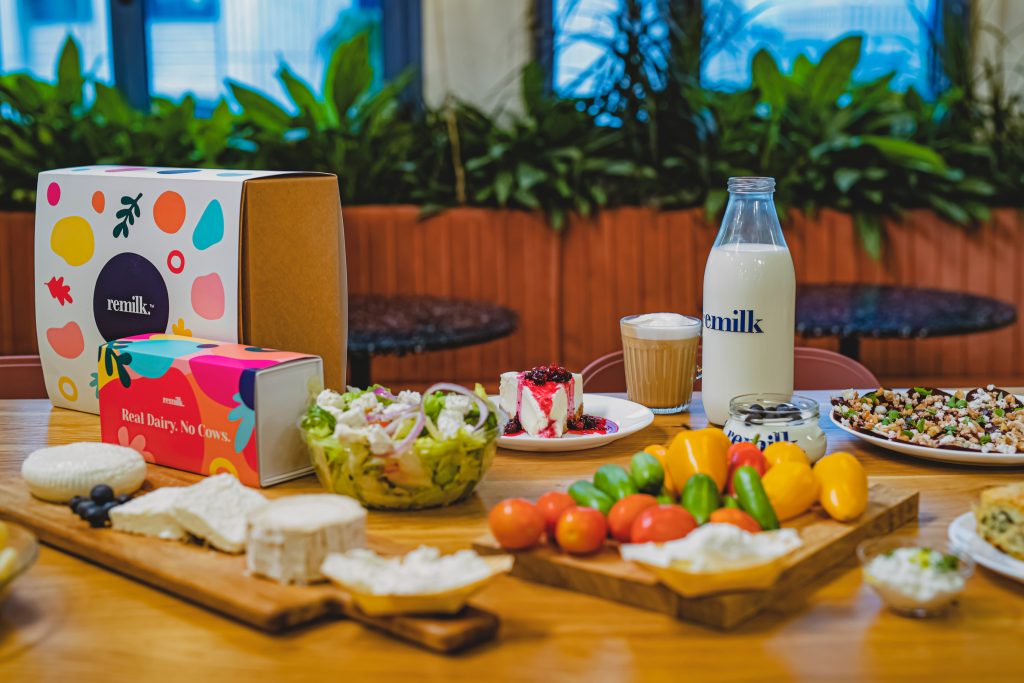Future Alternative recently spoke to Remilk’s head of business development, Jason Rosenberg, who took us through its “very similar to beer” precision fermentation process, as well as its grand plans for the global dairy protein market.
In the three years since launching, Remilk has raised $US11.3 million in a Series A funding round followed by $US120 million in an oversubscribed Series B round earlier this year. The huge cash injection has enabled Remilk to commit to a large-scale production facility in Denmark and take its synthetic dairy proteins to market.
Rosenberg credits the rapid rise of the multinational to a combination of CEO Aviv Wolff’s “hungry” entrepreneurship and CTO Ori Cohavi’s technical expertise. Wolff and Cohavi joined forces to establish Remilk in 2019 to address what they saw as a “sustainability crisis”.
Remilk, which describes itself as a B2B protein production company specialising in precision fermentation technology, is using yeast proteins to manufacture genetically modified synthetic dairy proteins for use in a variety of dairy products. Rosenberg described how the process of creating these proteins is remarkably similar to beer fermentation, with the yeast proteins taught to produce dairy proteins instead of alcohol.
Listen to Jason’s explanation of precision fermentation here.
Sustainability
Rosenberg also spoke in depth about sustainability being a driver of Remilk’s business model, discussing Wolff’s and Cohavi’s desire to create meaningful impact. This focus has driven them to establish one of Israel’s most successful alternative protein start-ups, no mean feat in one of the world’s hotbeds of alternative protein activity.
Rosenberg described the company’s “very positive preliminary results” from recent life cycle assessments (LCAs) of its production process, which he compared to the “extremely inefficient… process” of raising cattle for dairy production. Rosenberg said “it is clear to me that (precision fermentation) is much more sustainable from a land use and water use” perspective and that Remilk is “very reassured that the process is much more sustainable” than traditional dairy.
While Rosenberg predicted that LCAs in other precision fermentation companies would garner similar results, he also noted that the onus would be on individual businesses to “make their processes as sustainable as possible.”

The view from Israel
A combination of government backing, technical expertise and industrial innovation has seen Israel ranked as one of the leading nations in the alternative protein space. Rosenberg credited the “remarkable ecosystem of innovators” in Israel, the result of “an extremely close connection between… private industry, academia and the public sector” for this success.
While the collaboration between sectors in Israel has enabled alternative protein start-ups to flourish, Remilk also recognises the need to “align and collaborate with others to assist in the scale up and commercialisation stages of our technologies.”
For Remilk, which has ambitious aims to become a global leader in the synthetic dairy protein industry, this means looking beyond Israel.
Industrial symbiosis in Denmark
As a “pseudo-Mecca” for fermentation, Denmark was a relatively easy choice for Remilk, when considering where to establish its new production facility. Looking to expand production and capitalise on a “shortage of precision fermentation capacity around the globe”, the city of Kalundborg stood out for its “remarkable circular industrial park,” said Rosenberg.
Kalundborg hosts what is known as Symbiosis, an extensive industrial park of individual businesses that operates as a “circular economy” of operations, feeding off each other’s waste materials and sharing resources to find economic and environmental efficiencies. While Remilk’s precise role in this symbiosis remains to be seen, Rosenberg described it as a “phenomenal model that improves sustainability scores (and one that) many can mimic around the globe.”
The future of Remilk
Rosenberg also discussed the importance of labelling for consumer acceptance of synthetic dairy, suggesting “animal-free dairy” and “clean dairy” as labels that might sit well with consumers. But these are details that can be considered once regulatory approvals are gained, as inevitably, that’s what will dictate when and where Remilk launches its products.
Looking to the Asia Pacific, Rosenberg observed the different drivers that may push various markets to adopt precision fermentation products sooner rather than later. India, for example, has a public issue with “stray cattle”, while Chinese consumers are looking for solutions to dietary constraints including lactose intolerance. Then there’s Indonesia, which is unable to raise the cattle required to produce fresh dairy products at scale. Whatever the drivers may be, Rosenberg said Remilk is “looking to work with regulators around the globe to advance the… approval of (precision fermentation) technology.”
And while we’ll have to forgive Jason for his “frothy cappuccino” order, we’re excited at his predictions of synthetic, animal-free, clean, precision-fermented dairy hitting Aussie shores in the not-too-distant future.
Listen to the full conversation with Remilk’s Jason Rosenberg below.
To stay up-to-date on the latest industry headlines, sign up to Future Alternative’s enewsletter.
Posted on:


